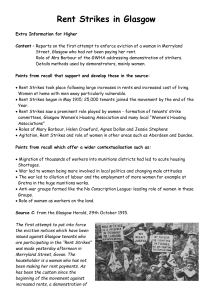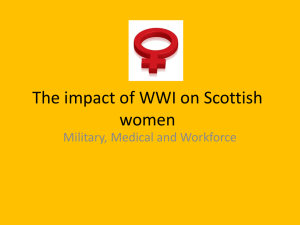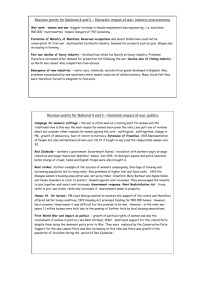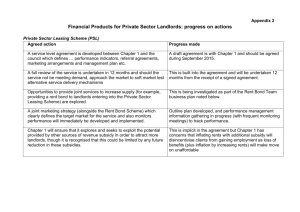Slide 1
advertisement
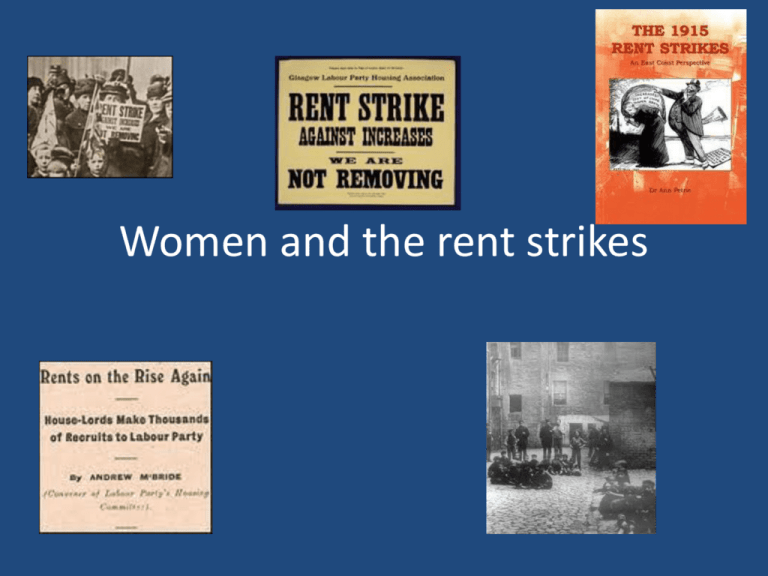
Women and the rent strikes What does radicalisation mean? • The Great War is said to have made many Scots more politically aware. • Another way of saying that is that people became radicalised. • The radicalisation of Scottish politics will be spoken about later but the rent strikes that started in and around Glasgow are perfect examples of people taking direct action to change or protect their way of life. What was a rent strike? • Rent strikes were the refusal of people, mainly women, to pay high rents charged by landowners. • In Feb 1915, Helen Crawford, Mary Barbour, Agnes Dollan and Jessie Stephens helped to form the Glasgow Women’s Housing Association to resist rent rises and threatened evictions. In May 1915 the first rent strike began and soon about 25,000 tenants in Glasgow had joined the strike. • Rent strikes began to spread to other Scottish cities such as Aberdeen and Dundee. • Landlords began to issue court orders and threaten the protestors with eviction, fine or prison. • In response the women made it impossible for the authorities to evict tenants, by blocking access to their tenements. Why did rent strikes start in and around Glasgow? • The Glasgow area was vital to the war effort. • The shipyards and engineering factories were crucial in producing the weapons, the munitions and the machines that Britain needed to fight the war. • As a result of the demand for workers, the population of Glasgow area increased as people arrived to meet the demand for workers. These new arrivals all needed somewhere to stay, and as a result demand for housing in and around Glasgow rocketed-and so did the rents that landlords charged. Housing conditions were often bad but landlords did little to improve their properties. • They knew that, as more and more people were looking for somewhere to live near to the large engineering factories, they could charge high rents for poor quality housing. 1.Soon ordinary people were being evicted from their tenement flats simply because they could not pay the rent that had increased as much as 20%. The women of Glasgow were furious at this profiteering. • Profiteering means taking advantage of a situation to make money while other people suffer and can do little about the profiteers. • Landlords bullied and threatened the women to make them pay higher rents. • There was a strong feeling that the landlords were taking advantage of the women, threatening them with eviction while their menfolk were away fighting in the war Faced with rising food prices and now rising rents, some women decided to fight back. Why was the government concerned about rent strikes? • On 17 November 1915 a mass demonstration in Glasgow’s George Square worried the government. • The radicalisation of the women had also inspired some men who now began to strike in sympathy with the women and to campaign for wage rises themselves • The government was under pressure. The rent strikes had grown to the extent that they threatened wartime production of necessary machines and munitions The answer was the Rent Restriction Act Rents were frozen at 1914 levels unless improvements had been made to the property. • The strikers’ demands had been met, protest and profiteering now declined and wartime production was maintained without disruption. • However, the strikers had learned an important lesson: that direct action could lead to positive results. The rent strikes of 1915 had a big impact on the radicalisation of many Scots... Did the war really change the image and status of working women? • When the war ended the majority of women did not keep their new wartime jobs. • The Restoration of Pre-War Practices Act meant that returning soldiers were given back their jobs and with the closure of most munitions factories women workers were no longer needed. Within a few years of the end of the war over 25% of all working women were back in domestic service. • Child minding. • Doing housework. • That total was more than before the war!!
